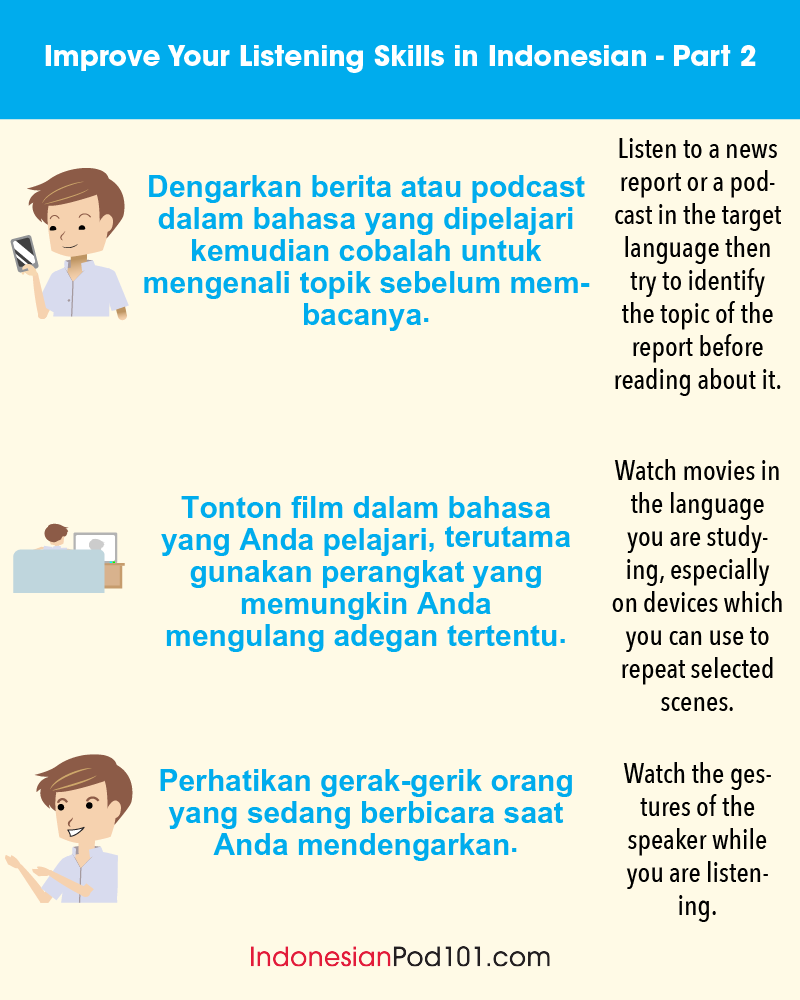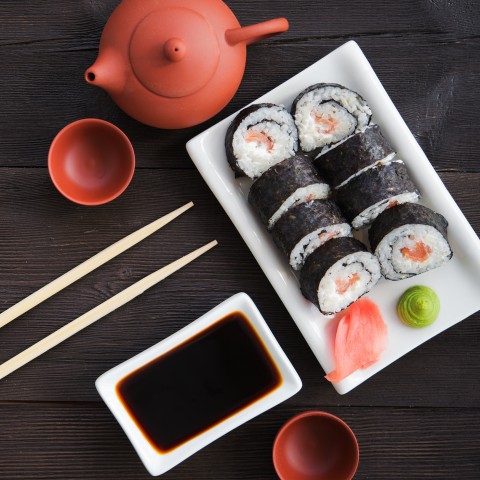
There’s a sort of balance between the different languages of the world.
Some have extremely complex systems of verb changes and noun changes, requiring you to think about every last little detail of who does what in the sentence so that you can get all the endings right.
Others say to themselves, “You know, all those extra grammatical endings aren’t for me.” So they simply put their words in a line and never change them.
The tradeoff is that these “simpler” languages have very inflexible word order. So what does this look like in Indonesian word order?
Well, if you switch the position of a few words in a sentence in, say, Russian, the grammatical endings will keep you informed about what you need to know. If you do the same in Indonesian, it starts getting hard to understand very quickly.
So Indonesian grammar is simple in some ways, but rigid in others. Fortunately for you, it never really gets that difficult!
With the examples in this guide, you’ll soon feel perfectly confident when you create your own Indonesian sentences.
Let’s get started with our lesson on Indonesian word order, and more essential grammatical points!
 Table of Contents
Table of Contents
- Overview of Indonesian Word Order
- Adjectives and Adverbs in Indonesian
- Prepositions and Their Phrases
- Verbs That Absorb Other Words
- Word Order in Indonesian Questions
- Conclusion
1. Overview of Indonesian Word Order

Indonesian belongs to the Austronesian language family, sharing roots with languages as diverse as Tagalog (in the Philippines), Malagasy (in Madagascar), Amis (in Taiwan), and Hawaiian.
Austronesian languages in general have very complex grammar and tenses, with lots of different particles attaching to the front, middle, and end of verbs to express very specific ideas.
Lucky for you, Indonesian is radically different from most other Austronesian languages, and in fact, it’s quite similar to European languages (at least on the surface)!
It belongs to the SVO group of languages, meaning that the order of the subject, the verb, and the object in the sentence is exactly that. First the subject, then the verb, and finally the object.
Let’s try a very simple sentence with all three elements.

- Cici menulis buku.
“Cici writes a book.”
It’s clear from the word order that the book is absolutely not writing Cici. In Indonesian as well as English, there are plenty of sentences that don’t require objects.
- Cici berlari.
“Cici runs.”
- Gloria berdiri.
“Gloria stands up.”
Verbs that start with me– usually, but not always, have an object; verbs that start with ber- never have an object.
Indonesian was actually designed to be quite regular in this regard, but over the decades (Standard Indonesian dates back to Indonesian independence in 1945), many people have gotten used to dropping the me- prefix. Crucially, the word order remains constant!
Like other Asian languages, Indonesian uses classifiers for its nouns. It’s just like saying “a pair of scissors” in English. You can’t just say “scissors” without the classifier “pair,” and in Indonesian, saying any noun without its classifier sounds equally weird.
Classifiers always appear before the noun, like they do in English (but opposite of how it’s done in some other Southeast Asian languages like Lao). There’s one general classifier that you can use for most things: buah. Whenever you say “one of something,” you add se- to the beginning of the classifier.
- Saya punya sebuah ponsel.
“I have a phone.”
2. Adjectives and Adverbs in Indonesian

In Indonesian, there’s not really a distinction between adjectives and adverbs. For one, both usually go after what they modify.
- Aku punya buku baru.
“I have a new book.”
- Aku membaca buku bahasa Inggris.
“I read English books.”
Suppose you have two adjectives you want to line up in a sentence? It’s imperative then to use the word dan, meaning “and,” to connect them. You’ll see at the end of the article what it means if we just say one adjective after the other.
- Buku ini murah dan berat.
“This book is cheap and heavy.”
Since Indonesian verbs can’t conjugate, we can’t use verb endings to show tense. Instead, that happens through time-marking adverbs, which, it just so happens, come before the verb.
- Aku akan membaca buku bahasa Jerman.
“I’m going to read German books.”
- Dia sedang membaca buku baru.
“She’s reading a new book.”
- Saya sudah membaca buku bahasa Inggris.
“I already read the English book.”
As you can see, the word “the” is implied from the context. These are artificial sentences, but when you’re actually speaking Indonesian with others, you’ll generally know if you should interpret buku as “the book” or “books.”
Another very common type of Indonesian adverb is dengan, meaning “with,” plus an adjective. It’s a little bit like saying that someone does something “with style” in English.
- Kamu menulis dengan indah.
“You write with beauty.” (“You write beautifully.”)
3. Prepositions and Their Phrases

The prepositional phrases in Indonesian are made with the locative particle di. This is combined with location words to create proper prepositional phrases.
In Indonesian language word order, all the prepositional phrases are placed after the main verb in the sentence.
- Aku memasak di dapur.
“I cook in the kitchen.”
Here, di gets translated to “in” because that’s the best way to describe the concept in English. It’s only implied in Indonesian, since without a location word, di doesn’t specify whether it’s “in,” “at,” or another preposition.
- Gloria berdiri di depan pintu.
“Gloria is standing in front of the door.”
- Pohon itu terletak di belakang rumah.
“The tree is located behind the house.”
This is a good time to introduce the word yang. You’re lucky that you can understand English, because yang is a perfect equivalent of the English words “that,” “which,” and “who.” Some languages don’t have a word for this concept, and their Indonesian textbooks have got to be a lot thicker!
- Pohon yang terletak di belakang rumah adalah pohon pinus.
“The tree that is located behind the house is a pine tree.”
Look carefully at the words in this last example and the one that came right before. You can see that the insertion of yang functioned syntactically just like “that” in English, giving us the opportunity to describe the tree in greater detail.
4. Verbs That Absorb Other Words

One very interesting thing about the Indonesian language is that verbs can absorb pronouns. If you know any Arabic, you’ll be nodding your head in agreement. And if you don’t (learning Arabic is not a prerequisite for learning Indonesian!), stay with us. It’s not that bad.
The pronouns in Indonesian are numerous and rather complex to explain here. In any case, just three of them can attach to verbs: aku, kamu, and dia. These are the informal versions of “I” and “you” respectively, and the neutral version of “he/she/they/it.”
- Dia memukul aku.
“He hit me.”
Here, the word order is just as we’ve been seeing in previous examples, with the subject first, then the verb, then the object. But let’s collapse that verb and object together:
- Dia memukulku.
“He hit me.”
It still has the exact same meaning! It can feel a little artificial sometimes to spell out or say the full pronoun, so most people tend to just use these pronouns as endings. Here are some more examples.
- Aku tidak melihatmu.
“I don’t see you.”
- Aku sedang memakannya.
“I’m eating it.”
5. Word Order in Indonesian Questions

If everything else has seemed pretty approachable, you’re now on the home stretch of easy street.
Simple yes-no questions in Indonesian are formed just like they are in English!
In English, we use “do” or “does” as a “dummy subject” for questions. The word apakah fills the same function in Indonesian, down to a T.
- Saya suka teh. Apakah kamu suka teh?
“I like tea. Do you like tea?”
It’s a word-for-word translation of the English, and it’s natural in both languages.
On top of that, there’s an alternate way to ask questions in Indonesian, this time using a suffix. See that -kah at the end of apakah? You can actually add that to a whole mess of verbs and adverbs.
- Sudahkah proyek selesai?
“Has the project finished already?”
Sudah is the adverb of time showing that something has “already” happened, and so you can add -kah to ask about the completeness of a particular action.
Again, these question words move to the front.
Indonesian also has the standard question words that you’ll remember from English, such as “who,” “what,” “where,” “when,” and “why.”
- Mengapa kamu suka sepeda besar?
“Why do you like big bicycles?”
- Karena sepeda besar nyaman.
“Because big bicycles are comfortable.”
Look at that last sentence. Literally, you’re saying “because bike big comfortable.”
This is what we were talking about earlier. You’re not saying “because bikes are big and comfortable” because there’s no dan, or “and,” connector. Because of this word order, it absolutely has to be “because big bicycles are comfortable.”
6. Conclusion

Lots of people find that Indonesian word order is something that ends up just coming naturally to them. How about you?
By first reading and listening to a lot of natural Indonesian and following along with the English translation, you can see how Indonesian sentences really get formed.
Be patient with yourself, and don’t try to speak before you’re ready.
It just so happens that the easiest place to do this is right here on IndonesianPod101.com. There’s nothing standing in your way, stopping you from picking up real, natural Indonesian without even thinking about it.Listen, read, and speak when you’re ready. That’s the core principle, and that’s how you end up a master of Indonesian!













 Table of Contents
Table of Contents







 Table of Contents
Table of Contents



































































